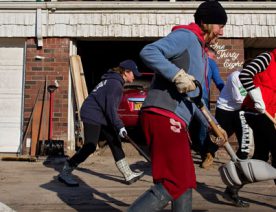
Community Resilience
The underlying issue
Stories about natural and manmade disasters have become, sadly, an all-too-familiar element of the news. While there is ample coverage of them while the disaster is unfolding—Superstorm Sandy, Hurricane Katrina, mass shootings, and the Gulf oil spill are just a few examples—in most cases coverage fades when the immediate disaster is past.
With funding from the Rockefeller Foundation, which has a long-standing commitment to support work on the issue of resilience, the AP-NORC Center for Public Affairs Research will sponsor a 9-month Fellowship in which a journalist will receive special training and a significant opportunity to do high-impact journalism on issues related to economic, psychological, and social resilience.
The Fellowship is designed to provide time to explore community resilience in all its forms. The daily workflow of most newsrooms often prevents reporters from taking the time they need to acquire the skills and background needed to synthesize and interpret the scope of the story, how it ties one community to another, and what might be learned so that policy makers can take action.
In addition, there is a wealth of cutting edge information about resilience and recovery that is being collected and analyzed at research institutions around the world on resilience and its definition and measurement that is never delivered into the public domain. Journalists too often lack the time and the tools to uncover these sources for stories that illuminate what is known about resilience.
About the Fellowship
The AP-NORC Journalism Fellowship on Community Resilience will train a person in the skills needed to do research-based enterprise journalism about community resilience in all its forms. The Fellowship will have an impact that will reach far beyond the fellowship term. The journalist will return to the newsroom with new skills and background to continue to report on resilience and recovery issues, and share that knowledge with colleagues. It is anticipated that over time other journalists will receive the same training, leading to a cadre of experts skilled in the use of research to tell some of the most important stories of the day.
Natural and manmade disasters, when they occur, are always at the center of the news, yet coverage of them almost always focuses on the event itself. The important lessons to be learned from the economic, psychological, and social resilience of communities are stories that are largely untold. The result is anecdotal coverage that takes a broad look at issues like resilience without the deeper exploration of the important lessons to be learned.
At the same time there is a wealth of cutting edge information being collected and analyzed at research institutions around the world on resilience, its definition, and measurement that is never brought to the attention of the public or of policy makers.
With funding provided by the Rockefeller Foundation, the AP-NORC Journalism Fellowship on Community Resilience is designed to directly address these issues. Through the Fellowship, an experienced journalist with a track record of interest in resilience will spend nine months working with the AP-NORC Center to explore resilience in its various forms and on special research and reporting projects.
The Fellowship is designed to address the need for more journalists with the skills required to do research-based enterprise reporting. The Fellow will spend a significant amount of time doing research and reporting in the New York and New Jersey areas that were affected by Superstorm Sandy and in Chicago for training.
The program will provide the AP-NORC Fellow with the training, skills, writing opportunity and, most importantly, time to explore resilience in all its forms and to become expert in producing research-based enterprise journalism on this important topic. The Fellowship will include the opportunity to write stories about resilience that will be distributed by the AP, providing an unparalleled distribution platform for the Fellow’s work.
The two primary elements of the Fellowship:
1) A distinctive training opportunity
The AP-NORC Journalism Fellowship on Community Resilience offers the opportunity to undertake formal and informal training in research methods, urban studies, and sociology as they relate to the larger issue of various forms of community resilience. The Fellow will develop and enhance social science, statistical, and other analytical research skills needed for research-based enterprise journalism on community resilience issues.
Elements of the education opportunity include:
- Work with members of the leadership team of the AP-NORC Center and senior scientists at NORC who will serve as mentors throughout the fellowship process, expediting access to the wealth of resources available to the Fellow.
- Access to the research and academic resources of NORC at the University of Chicago and the University of Chicago itself as part of a highly individualized training program.
- Exploration of the substantial body of resilience research that is being collected and analyzed at research institutions around the world on resilience and its definition and measurement.
- A travel and conference budget to engage in learning opportunities, meetings with experts, or short courses elsewhere.
It is anticipated that this formal training in the techniques of research in support of enterprise-based journalism will account for about 40 percent of the Fellow’s time.
2) High impact journalism
The AP-NORC Journalism Fellow will be expected to produce in-depth reporting on issues of resilience.
Elements of the writing opportunity include:
- Training in the analytical research skills needed in research-based enterprise reporting.
- Work with an AP editor to develop innovative reporting projects around resilience issues that reflect the work of a person given the time to write longer stories on resilience as opposed to breaking news coverage.
- Access to the sources, resources, and expertise available through the AP, NORC, the University of Chicago, and others as useful and appropriate in doing the reporting.
- Writing stories on a regular basis, subject to AP editorial standards, that will run on the AP media platforms, ensuring that the Fellow’s work will receive vast exposure.
- Opportunity to pursue local or regional interest stories related to the project.
The Fellow will contribute to and report on an in-depth research project on community resilience and recovery that will be conducted in communities that were affected by Superstorm Sandy.
It is estimated that enterprise reporting will account for about 60 percent of the Fellow’s time.



